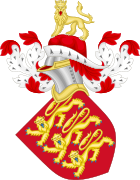Statute of Northampton facts for kids
| Act of Parliament | |

|
|
| Citation | 2 Edw. 3 |
|---|---|
The Statute of Northampton was an important law made in England way back in 1328. It was created by the Parliament of England, which is like the government's law-making group. This meeting happened in a town called Northampton.
At the same meeting, the Parliament also approved a peace agreement. This agreement was called the Treaty of Edinburgh–Northampton. It officially ended a long conflict known as the First War of Scottish Independence. So, this law helped bring peace and order to the country.
Contents
What Was the Statute of Northampton?
This law was a collection of rules and decisions. It covered many different parts of life in England during the 14th century. Laws like this helped the king and his government manage the country. They also tried to keep things fair and peaceful for everyone.
What Did the Law Say About Carrying Weapons?
One of the most talked-about parts of this law is Chapter 3. It talked about people carrying weapons. This part of the law said that most people were not allowed to carry weapons. They could not go armed in public places like markets or near judges.
- Who could carry weapons?
- The King's servants when they were with him.
- Officials doing their jobs, like police or judges.
- People helping these officials in an emergency, like when there was a call for help to keep the peace.
If someone broke this rule, they could lose their weapons. They could also be sent to prison by the King.
Why Is This Part of the Law Still Discussed?
This old law is still talked about today, especially in the United States of America. People sometimes discuss it when they talk about the Second Amendment. This amendment is about the right to keep and bear arms in the U.S.
However, there are different ideas about what the old English law really meant.
- What kind of "arms"? In 1328, firearms like guns did not exist. So, "arms" likely meant swords, daggers, or armor.
- "Armed" or "armor"? The original text was in French. It's not perfectly clear if "armed" meant carrying a weapon or wearing protective armor.
- Prohibition or permission? Some people think it mostly stopped people from carrying weapons. Others think it allowed official groups, like a militia, to carry them.
These different ideas show how tricky it can be to understand old laws.
Rules for Fairs and Markets
Chapter 15 of the Statute of Northampton also had rules for fairs. Fairs were big markets where people bought and sold goods. They were very important for trade.
- Fair closing times: The law said that a fair had to close on time. The owner of the fair had to announce when it would close.
- Penalties for breaking rules: If a fair stayed open too long, the owner could be fined. Merchants who kept selling goods after the closing time could also be punished.
How Were These Rules Enforced?
A few years later, in 1331, a new law made it easier to enforce these fair rules. This new law included something called qui tam provisions.
- What is qui tam? It meant that regular citizens could help enforce the law. If someone saw goods being sold after a fair closed, they could report it.
- Sharing the fine: The citizen who reported the wrongdoing would get a share of the fine. They would receive a quarter (one-fourth) of the money collected from the fine. This encouraged people to help make sure the rules were followed.
This qui tam system was used for a very long time. It was not removed from English law until 1951.
See also
 | John T. Biggers |
 | Thomas Blackshear |
 | Mark Bradford |
 | Beverly Buchanan |

